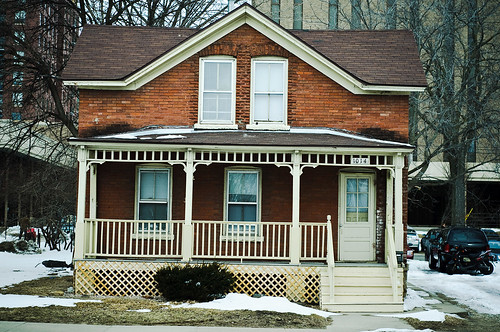
photo credit: Maxwell GS
When Donald Franklin became a widower he wasn’t prepared for the financial consequences. He and his wife Wilma had become accustomed to both of their pensions and both of their social security incomes. However, his survivor benefits paid him only half of her pension and none of her social security. Donald not only lost his wife; he lost about one third of their combined retirement income. With full equity in their house, Donald decided to use a reverse mortgage to boost his income and allow him to stay in the family home where he and Wilma had lived for the past 45 years. Could Donald have made better financial arrangements? Maybe, he just couldn’t bear the thought of living anywhere other than his beloved home place, and he was happy with the way it worked out.
Now…lest you infer from the title and opening paragraph that I am pounding the drum for reverse mortgages, please understand that this post is part of four part series.
In Post One, “Reverse Mortgages, Part One: Digging Beneath the Surface”, we attempted to demystify reverse mortgages. If you want to better understand reverse mortgages, you might want to read Part One before continuing with Part Two.
Parts Three and Four will be “What Are The Disadvantages?” and “Is a Reverse Mortgage for You?” respectively.
So…before we investigate the advantages of a reverse mortgage, let’s review the definition and essential facts:
Definition
A reverse mortgage is the opposite of a traditional mortgage. With a traditional mortgage, the borrower builds equity in his house by paying down a loan taken against the house. With a reverse mortgage, the borrower gives up home equity in exchange for payments from the lender.
Essential facts
- The home owner must be at least 62 years old to qualify for a reverse mortgage.
- The home must have substantial equity.
- Credit scores are irrelevant.
- Any previous mortgage will be paid off by the reverse mortgage.
- You can receive your payments by lump sum, monthly payments, line of credit or any combination.
- The borrower retains the title on the house, meaning that he is responsible for all taxes, insurance and maintenance
Now: what are the advantages of a reverse mortgage? We will start with general advantages and then give some scenarios where a reverse mortgage could help.
General advantages of a reverse mortgage
Increased income
If the homeowner has great home equity but is struggling to make ends meet, a reverse mortgage will boost that income.
Assurance of staying in home
As long as the homeowner stays current on taxes, insurance and maintenance, he can have the security of knowing that he will never be forced to move out of his house.
No monthly mortgage payments
The reverse mortgage loan will not need to be repaid unless the homeowner decides to move or sell the house.
Tax free money
Because the reverse mortgage is a loan, it is not considered taxable income.
Easy qualification
Qualification is easy because income and credit history are not considered.
Maintain independence and self esteem
The income from a reverse mortgage will not only help a senior stay in the home, but the financial independence could eliminate the possibility of asking for help from children.
Possible Scenarios Where Reverse Mortgage Could Help
Survivor spousal income is not enough.
This was the case with Donald Franklin. When both spouses are drawing Social Security income, the surviving spouse only gets the higher of the two pensions…not both. If one is drawing a pension from a previous job, that pension is commonly reduced by 50% for the surviving spouse. This reduction in income could be partially or fully replaced by a reverse mortgage.
Leaving the home equity as an inheritance is not important.
Perhaps there are no children. Or maybe the home equity is simply not important to the children. Either way, using the equity while the homeowner is alive could be a good option.
Prevents emotional trauma of moving
If one or both homeowners have an emotional attachment to the home, a reverse mortgage could assure them that financial issues will not force them to leave the home. For some senior citizens, moving from their beloved home place could be extremely traumatic.
Prevent foreclosure
If the homeowner gets behind on mortgage payments, and if the home has great equity, a reverse mortgage will pay off the existing mortgage, eliminating not only the possibility of foreclosure but future mortgage payments
Have you or your family members used reverse mortgages? Were there any surprises? Would you (or your family member) recommend a reverse mortgage to a friend?
Learn More About Reverse Mortgages – these links will help:

Leave a Reply